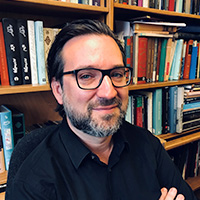 View CV
View CV
I was born in Germany to an Iranian mother and an English father, and raised in the UK from the age of 5. My interest in Iran was first sparked in 1979 when my grandmother arrived from Tehran as a refugee fleeing religious persecution. The decade she lived in our home, my grandmother kindled within me a passion for the Iranian side of my heritage that has only grown with age. Though I grew up in the diaspora and was not able to travel to Iran until 2000, over the past two decades I have visited Iran on average once every two years and have developed good working relationships with a diverse group of Iran-based humanities professors and researchers. In addition to these visits to Iran, I have also spent time in Afghanistan and Tajikistan.
A first-generation university graduate, I hold a BA in Arabic with Persian and a DPhil in premodern Persian poetry from Oxford. I am currently Professor of Persian Literature and Iranian Culture in the Faculty of Asian and Middle Eastern Studies at the University of Oxford where I have taught for the past 10 years. I also hold the position of Senior Research Fellow in Persian at Wadham College. Before returning to Oxford in 2013, I was Assistant Professor of Persian and Comparative Literature at Stanford University, and before that I held Persian Studies teaching positions at the University of Manchester, and at McGill University. At Oxford I have served as both Director of Undergraduate Studies and Director of Undergraduate Admissions for the Faculty of Asian and Middle Eastern Studies, the largest department of its kind in the UK, and one of the largest globally.
I am a literary critic who works across a wide range of Persian genres. My research focuses on three primary areas: i) premodern Persian poetry and prose (with specific reference to patronage, performance, conviviality, sexuality, intertextuality and the relationship between Persian and Arabic imagery and form); ii) early Qajar poetry (with a focus on gender, canonicity, and indigenous literary history); and iii) women poets of twentieth-century Iran and their dialogue with (and disruption of) the male-dominated literary tradition. In addition to these three periods of Persian literary history, I have also published on Iran’s non-Muslim religious minorities.
In 2020, my monograph, Hafiz and His Contemporaries: Poetry, Performance, and Patronage in Fourteenth-century Iran (Bloomsbury, 2019) won the Saidi-Sirjani Book Award. My next monograph will be published in 2025 by University of Michigan Press under the title Center, Periphery, and Gender: Poetic Resurgence in Early Qajar Iran. In addition to these monographs I have published peer-reviewed articles in Iranian Studies, Middle Eastern Literatures, and Iran: the Journal of the British Institute of Persian Studies. I have also edited or co-edited three collections of essays: Forugh Farrokhzad, Poet of Modern Iran: Iconic Woman and Feminine Pioneer of New Persian Poetry (with Nasrin Rahimieh, I B Tauris, 2010; expanded second edition, 2023); Ruse and Wit: The Humorous in Arabic, Persian, and Turkish Narrative (ILEX/Harvard University Press, 2012); and The Baha’is of Iran: Socio-historical Studies (with Seena B. Fazel, Routledge, 2008). My publications in the field of Persian language learning include Media Persian: An Essential Vocabulary (Edinburgh University Press, 2011) and two volumes co-authored with Pouneh Shabani-Jadidi, The Routledge Introductory Persian Course: Farsi Shirin Ast (Routledge, 2010; revised second edition, 2020) and The Routledge Intermediate Persian Course: Farsi Shirin Ast Book 2 (Routledge, 2012; revised second edition, 2023).
I have been an active participant in AIS conferences as speaker, panel organiser and/or chair since the early 2000s. I have previously served on the AIS Council and, from 2004-2014, I served as Assistant Editor for Iranian Studies. I am currently a member of both the Editorial Board of Iranian Studies and the International Advisory Board of Middle Eastern Literatures. In the UK, I previously served as a member of the Governing Council of the British Institute of Persian Studies and, most recently, I have established a new book series with Bloomsbury: I B Tauris Studies in Medieval and Early Modern Persian Literature.
If elected to the AIS Presidency, I would seek to lead through close consultation and collaboration with the members of the Council. I am a strong believer in the power of dialogue and debate, and I would look to bring more of both to decision-making within AIS. Any academic association is only as strong as its members and I would continue the concerted efforts of previous presidents to both grow and diversify our membership. As someone who has lived and worked in the UK, Canada, and the US, I am well-placed to foster greater cohesion between Iranian Studies scholars across these three countries. To date, the AIS presidency has been dominated by North America-based academics. With a UK-based presidency, I believe there would be greater scope for closer collaboration with our colleagues in Europe, the Middle East, and beyond. Almost all past AIS presidents have been Iran-born historians or other social scientists. As a literary scholar born outside of Iran, I feel I would bring a different approach to positioning AIS in the international academic community.
Beyond cultivating a closer relationship between our members in the Eastern and Western Hemispheres, as president I would focus my energies on two key areas: 1) forging deeper engagement with our membership in Iran and 2) increasing AIS efforts to raise awareness both in academia and the wider public around the ever-increasing violation of academic freedom in Iran and Afghanistan. Whilst maintaining a focus on universities, I would like AIS to do more to protest against the detention of high school teachers and informal educators, in particular those from ethnic and religious minorities. Though primarily an association for researchers and students at the tertiary level, I believe AIS also has a duty to speak out against government intimidation and discrimination at the primary and secondary levels.
